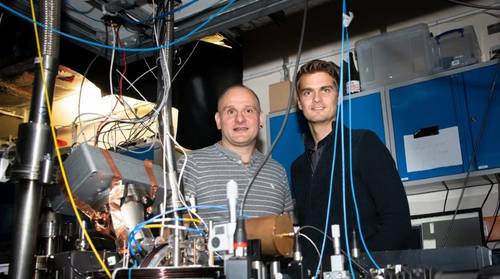Universal Quantum is a Brighton-based company building the world’s first million qubit quantum computer. Now, the company has announced that they have gained a £7.5 million government grant.
This was provided by Innovate UK’s Industrial Strategy Challenge Fund to build a scalable quantum computer that can correct its own errors. Notably, this is the most significant challenge in the race to build commercially viable quantum technology.
Consortium to commercialise quantum computers
Universal Quantum will lead a consortium that includes Rolls-Royce, quantum developer Riverlane, and world-class researchers from Imperial College London and The University of Sussex, among others.
The consortium will tackle a major challenge in making quantum computers commercially viable, correcting the errors that quantum bits – qubits – are prone to. The consortium is taking a cohesive approach, addressing the key issues to make a useful quantum computer at the software, hardware and end-user level.
Besides Universal Quantum, a University of Sussex spin-out company, the consortium brings together sector leaders covering key areas of quantum computing development.
The consortium includes end-user Rolls-Royce supported by the Science and Technology Facilities Council (STFC) Hartree Centre, quantum software developer Riverlane, supply chain partners Edwards, TMD Technologies (now acquired by Communications & Power Industries (CPI)) and Diamond Microwave, commercialisation and dissemination experts Sia Partners and Qureca and world-class academic groups from Imperial College London and the University of Sussex.
The consortium will bring together quantum hardware and software experts with world-class engineers and UK businesses, creating a new quantum ecosystem for the UK and boosting the burgeoning quantum tech cluster in the Greater Brighton City Region.
Dr. Sebastian Weidt, Co-Founder and CEO at Universal Quantum and Lecturer in Quantum Technologies at the University of Sussex, said: “Error correction is crucial to achieving anything really useful with quantum computers, so we are absolutely delighted to have been awarded this grant. This project is an important step forward, helping us to go from today’s proof of principle machines to scalable quantum computers that can solve some of the world’s most pressing computational challenges.”
Prof. Winfried Hensinger, Co-Founder and Chief Scientist at Universal Quantum and Director of the University of Sussex Center for Quantum Technologies, said: “Universal Quantum’s scalable approach to building quantum computers overcomes major barriers to large-scale quantum computing using trapped-ions. Instead of complex laser-based technology, we process quantum information by applying voltages to a microchip analogous to a classical transistor. Where other devices use complex photonic interconnects between quantum computing modules, we use ultra-fast electric field connections that can be orders-of-magnitude faster and rely on much simpler engineering.”
Resolves problems in aerospace sector
Universal Quantum was founded by Prof. Hensinger and Dr. Weidt in 2018 as a University of Sussex spin- out company. It is focused on creating a million-qubit quantum computer from day one. Its unique, electronic quantum computing modules are based on silicon technology where individual modules are connected using ultrafast electric field links to form an architecture that scales.
Using its scalable hardware, Riverlane, STFC Hartree Centre and experts from Rolls-Royce will map a specific use case to Universal Quantum’s computer, solving a set of Computational Fluid Dynamics (CFD) problems in the aerospace sector.
Dr. Steve Brierley, CEO and Founder of quantum software company Riverlane, said: “Quantum computers will only be truly valuable if we can crack the challenge of quantum error correction. Software and hardware perspectives will need to come together and work collaboratively to make this happen. This is why Riverlane is so excited to be part of the consortium: Our integrated approach to solving the error correction problem will make quantum computers useful sooner and help companies like Rolls-Royce use the immense powers of quantum computers to usher in a new era of computer- driven aerospace engineering.”
Prof. Leigh Lapworth, Rolls-Royce Fellow in Computational Sciences, said: “We are excited to be part of this consortium and to be leading the work package on quantum Computational Fluid Dynamics algorithms. We’re one of the world’s leading industrial technology companies, pioneering solutions to some of the world’s biggest technological challenges. CFD is crucial to meeting our ambitions, but it must be scalable, accurate and robust. These are cutting-edge challenges for a quantum CFD algorithm, and this unique consortium brings together the UK’s world-leading quantum computing experts to address them.”
The post Brighton-based Universal Quantum wins £7.5M grant to build scalable quantum computer appeared first on UKTN (UK Tech News).



